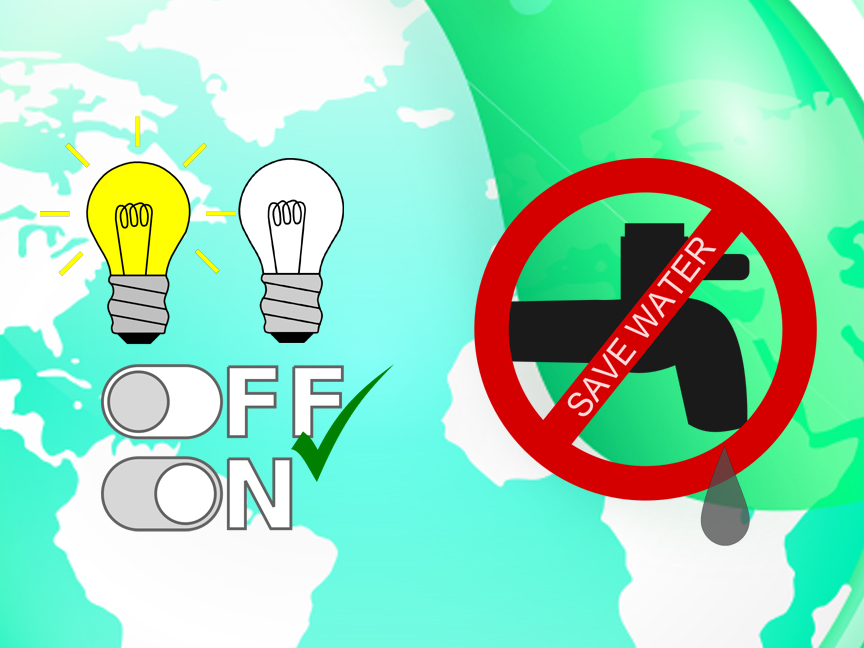OPINION: Conserve energy in many different ways
There’s many ways to conserve energy, protect the environment
When considering how to be energy and environmentally friendly, there’s a lot of different options.
September 22, 2020
Ever since I was little, I was taught many ways to conserve energy: turn off the lights when I leave the room, check the bottom of bottles to see if they are recyclable and so forth.
The issue of energy conservation spans many topics and not all of the blame is on the consumer.
“College students are often the least problematic in terms of energy usage,” said Meagann Russell, senior environmental and ecosystem sciences major.
Since college students live on a budget, they’re more driven to keep costs down – especially where energy bills are concerned.
“They’re going to do what they need to do to conserve energy and oftentimes they don’t get a choice about where their power is coming from,” Russell said. “They don’t get a choice if they don’t have efficient washers and dryers, refrigerators, things like that.”
She said students are often paying for the utilities that they use in their apartments and find different ways to cut down on their costs.
“Because we don’t own the space that we’re living in, it’s kind of harder to be efficient,” said Kynan Rutan, junior environmental and ecosystem sciences major.
He said students should go to their apartment complex managers to raise concerns.
Because students in apartments are able to leverage their status as renters, they have more of a say in terms of energy usage.
“You’re in a position of power because you’re the one who’s paying to be there and so because of that, you can go to your office and say ‘Hey, have you guys thought about putting in energy efficient lighting or putting in energy efficient washers and dryers,'” Rutan said. “Even if it won’t necessarily happen, they will still hear you and think about it.”
Russell said college students are not the main problem when it comes to energy conservation.
“I think college students are pretty stringent about their electricity bills and oftentimes there’s this idea that somehow us as individuals need to do all we can to do because somehow we’re the problem but oftentimes it’s more industrial companies are the ones that put out the most energy,” Russell said.
She said Coca-Cola is a good example and explained how they like to greenwash, which is when a company uses green public relations and marketing in order to convince consumers that they are environmentally friendly.
“[They say] they are doing these amazing environmental things but in actuality, they are low-balling their goal and not meeting their target,” Russell said. “They wanted all of their bottles to be 50 percent plant-based but that was 10 years ago and they have never reached that first goal.”
Russell said there was a shift from glass bottles to plastic bottles. She said Coca-Cola’s plan to make plant-based bottles is not sustainable, due to the corn-based plastic.
“At the end of the day, every big company is obviously there to make money and a lot of the time, the best way to make money quick and easy is not always the best for the environment, so I think it’s important to look where you are buying from,” Rutan said.
Russell and Rutan both said students should look into what company they are buying from and what that company is doing in order to conserve resources. They also mentioned fast fashion and economic class, and how sometimes that is the only option for students.
“You want to be ethical but depending on what economic class you sit in, sometimes that’s not even possible,” Russell said.
Russell and Rutan said to not buy fast fashion when you can and if you need to, use methods such as thrifting. They also said to have discussions with other students, which is a way to spread awareness.
“If you cannot buy sustainably, it’s a lot easier to just buy what you can and then make it last,” Rutan said.
The WSU Environmental Science Club is also trying to raise awareness with events, such as virtual documentary nights. The club also focuses on sustainable projects, such as their past introduction of reusable to-go containers at Northside Dining Hall.
They have participated in community projects as well, such as stream clean-ups and volunteering in the community. Those interested in joining the WSU Environmental Science Club can contact Meagann Russell at meagann.russell@wsu.edu.











